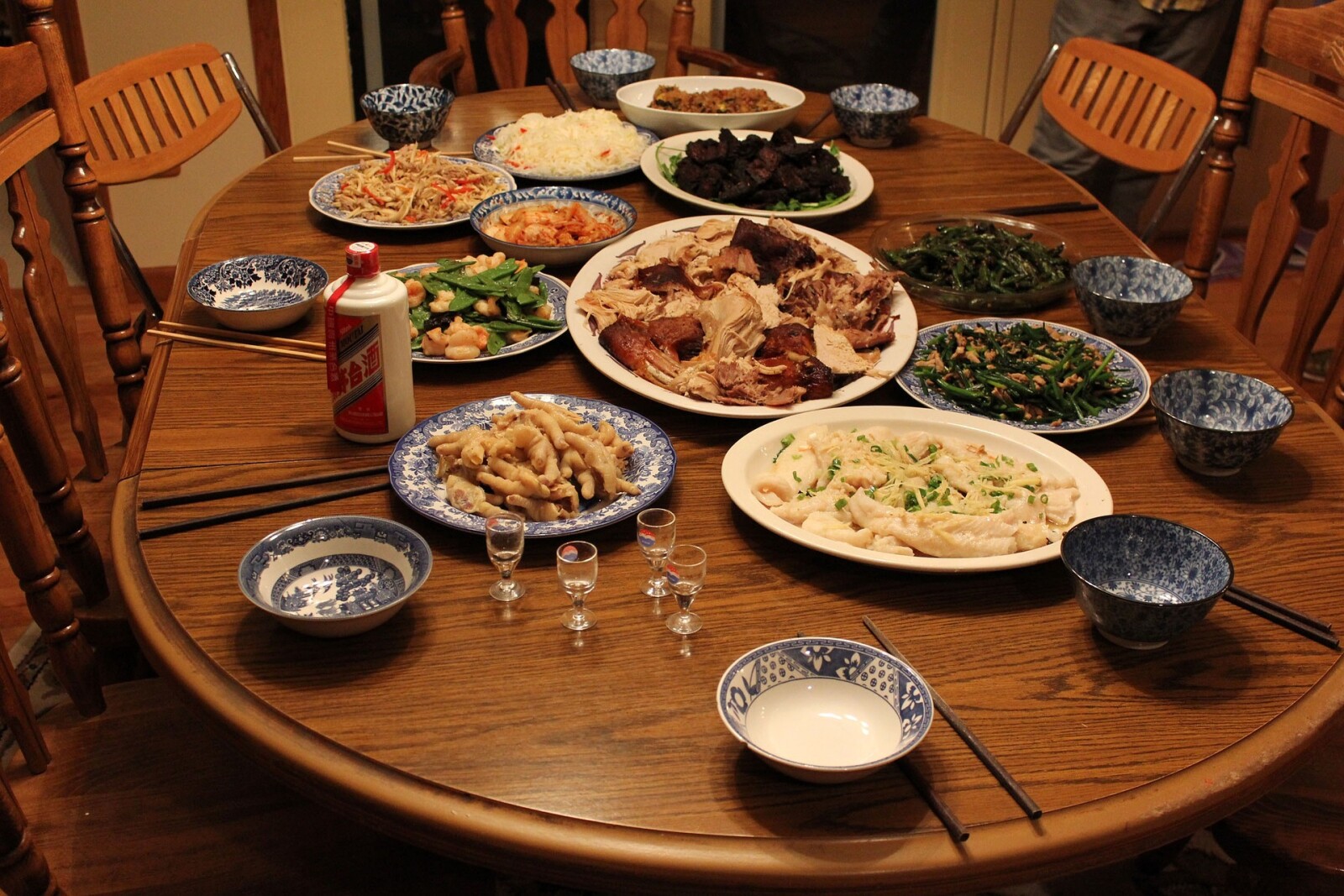The Intertwined History Of Jews, Christmas, And Chinese Food

When people imagine a Christmas feast, what usually comes to mind is a long, stacked table plucked straight from a Norman Rockwell painting. A holly-laden centerpiece, smiling blond children and full plates. Maybe the classic Christmas ham, so studded with cloves it resembles an aromatic body modification enthusiast. A reformed Scrooge screamed for an orphan to purchase a Christmas goose, at which point the bird became a staple on the menu as well.
The American Jewish population, however, has a different popular mental smorgasbord when it comes to the birth of the figure they regard as definitively not the messiah. It’s no surprise that the ham isn’t nearly as welcome on the table, but it’s not goose, turkey, or chicken that come steaming in from the kitchen. It’s not even traditional Jewish celebratory fare like brisket. Instead, for a lot of American Jews, it’s visions of dumplings, not sugar plums, that dance through their heads. If there’s a bird at the table, it’s probably of the Peking variety, and the chances of a lo mein appearance are infinitely higher than any Christian feast.
I can vouch for this personally as a lifelong, weather-machine operating, space-laser firing, East Coast Jew. Both I and many of my Jewish friends would find ourselves paying tribute to the great General Tso every December twenty-fourth or twenty-fifth, trading christmas crackers for fortune cookies. The lack of presents might have been disappointing as a kid, but the meal wasn’t, given that Chinese food is pretty god damn delicious. Honestly, I’ll take fried rice over mashed potatoes any day.

So where exactly did this tradition come from? The joys of beef and broccoli were never trumpeted in the Old Testament, and the oil that lasted 8 days on Hanukkah was in a temple lamp, not a wok full of potstickers. At a base, convenience level, and what I assumed even as a child, it’s simply the fact that Chinese restaurants are actually open on Christmas. This is both true and a big part of the choice, even today. Anybody who’s tried to buy a phone charger on Christmas Day after they forgot theirs at home/in the airport can vouch for the economical ghost town that most cities turn into on Christmas. Unless you feel like making more phone calls than most people my age make in a whole year seeing if restaurants are open, it’s a lot easier to head over to your local Cantonese spot.
Some research, though, shows that dating back over a century, Chinese restaurants have been a haven for Jewish diners for a variety of reasons beyond the hours they keep. Unsurprisingly, a principal location where this relationship started to develop was in the modern conservative’s idea of hell known as New York City. In the early 20th Century, there was a huge Jewish immigrant population in New York’s Lower East Side, just doors down from Chinatown. As there were (I wish I could say “back then”) a lot of less-than-friendly attitudes towards both Jews and the Chinese, the Jewish community found both a delicious new cuisine and a reliably friendly category of eatery that they could eat at without fear of discrimination.
Chinese restaurants scored another point due to their friendliness to kosher dining rules. This might send an eyebrow up at first, given that most people might immediately think of a preponderance of pork and shrimp in many beloved Chinese traditions. By the way, fried rice with shrimp in it is NO bueno, but rice fried BY a shrimp? Totally kosher. The rule these early American Jews were looking to follow, though, is a lesser-known rule, today only really followed by the most orthodox of the Jewish population these days.

This is a rule called kashrut that forbids the mixing of meat and dairy in the same meal. It can partially be traced back to a line from the torah forbidding “cooking a kid in it’s mother’s milk”, and some particularly observant Jews may even keep separate sets of kitchenware for meat and dairy. Though they may make heavy use of pork and shellfish, Chinese restaurants use very little dairy in cooking, making them generally safer than angering Adonai with the evil of a chicken alfredo. In a cityheavily fueled by the bacon egg and cheese, you can see how this rule eventually was abandoned basically out of sheer inconvenience. Similar to how Christian megachurch pastors gave up on the inconvenience of helping the poor.
The relationship only became stronger right around some big historical happenings in the ballpark of the 1940s, when Jews weren’t exactly feeling like heading to New York’s Italian or German restaurants most nights. By the time the war ended, the chinese restaurant had joined the delicatessen as a Jewish staple. Even though, as the years went on, as more and more Jewish families relaxed their dietary restrictions, and the prevalence of anti-Jewish and anti-Chinese discrimination… well, uh, SORT of went down, the relationship stayed strong. The availability of Chinese food on what was not only a Christian but a federal holiday still remained as well. In fact, it almost became its own windfall of a holiday for Chinese food restaurateurs. One said to Mental Floss, “I think we do more business on that day than many restaurants do in three months.”
So a tradition and a relationship that began as America grew remains strong today. While the Anglo-Saxons gather around a glowing pine, Jews will continue to fill the seats around a fully-loaded Lazy Susan. Next time you’re walking around the neighborhood, enjoying the Christmas lights, don’t be surprised if you see an equally welcome glow from your local dumpling house.





